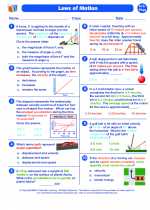Volcanic Gases
Volcanic gases are emitted during volcanic eruptions. These gases are released from the magma and can have significant impacts on the environment and human health.
Composition of Volcanic Gases
Volcanic gases primarily consist of water vapor, carbon dioxide, sulfur dioxide, hydrogen sulfide, and other trace gases such as carbon monoxide, hydrogen, and hydrogen chloride.
Impacts of Volcanic Gases
Volcanic gases can contribute to the greenhouse effect, leading to global warming. In addition, sulfur dioxide can lead to the formation of acid rain, which can harm vegetation and aquatic life.
Monitoring and Mitigation
Scientists monitor volcanic gases to track volcanic activity and predict eruptions. Mitigation strategies include the use of gas masks and evacuation plans in affected areas.
Study Guide
- What are the primary components of volcanic gases?
- How do volcanic gases contribute to the greenhouse effect?
- What are the environmental impacts of sulfur dioxide emissions from volcanic eruptions?
- How do scientists monitor volcanic gases?
- What are some mitigation strategies for dealing with volcanic gases?
◂Physics Worksheets and Study Guides High School. Laws of Motion - Set I
Worksheet/Answer key Laws of Motion - Set I
Laws of Motion - Set I  Worksheet/Answer key
Worksheet/Answer key Laws of Motion - Set I
Laws of Motion - Set I  Worksheet/Answer key
Worksheet/Answer key Laws of Motion - Set I
Laws of Motion - Set I  Worksheet/Answer key
Worksheet/Answer key Laws of Motion - Set I
Laws of Motion - Set I 

 Worksheet/Answer key
Worksheet/Answer key
 Worksheet/Answer key
Worksheet/Answer key
 Worksheet/Answer key
Worksheet/Answer key

The resources above cover the following skills:
PHYSICAL SCIENCE (NGSS)
Energy
Students who demonstrate understanding can:
Develop and use models to illustrate that energy at the macroscopic scale can be accounted for as either motions of particles or energy stored in fields.